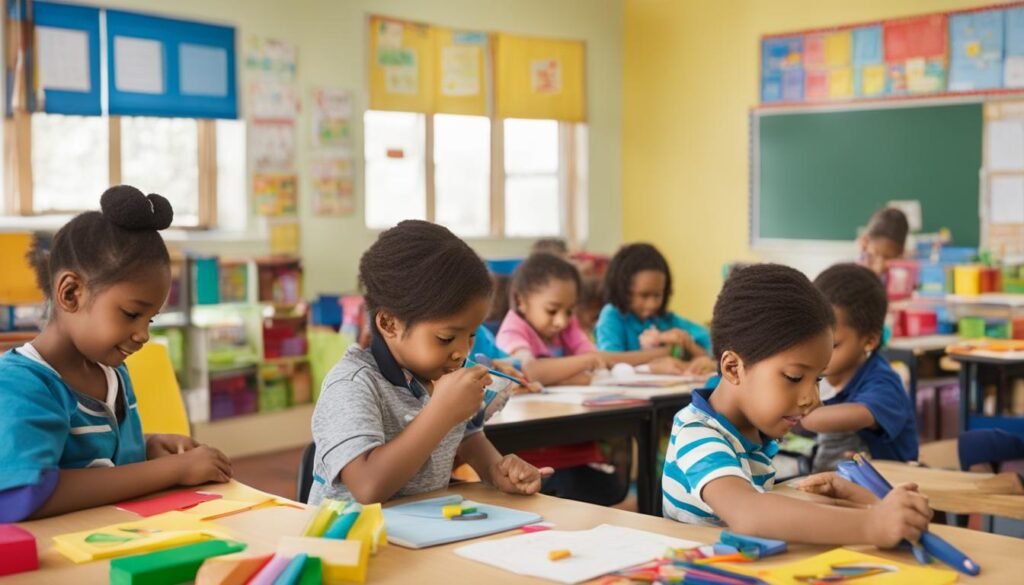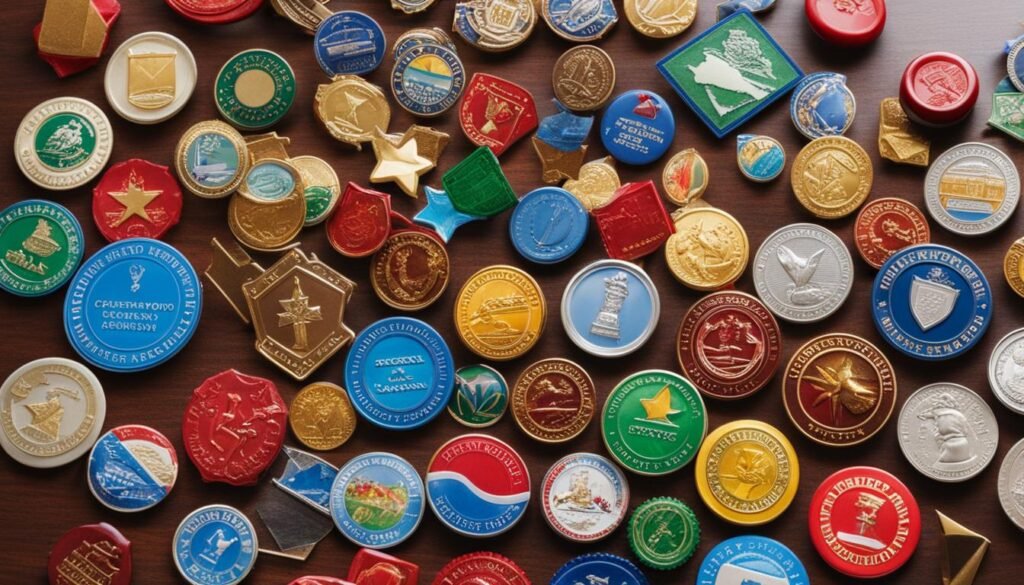Early childhood education is a crucial period for development and learning. To become qualified to teach and inspire young minds, educators must obtain an early childhood education certification. This certification demonstrates that teachers have met the rigorous standards set forth by their state’s Department of Education and have the knowledge and skills to effectively educate young children aged 3 to 8. With an accredited early childhood education certification, teachers are equipped to create a nurturing and engaging learning environment that fosters the love of learning in their students.
Key Takeaways:
- Obtaining an early childhood education certification is crucial for educators who aspire to teach young children.
- By obtaining certification, teachers demonstrate their commitment to professional growth and development.
- Certification ensures educators have the necessary knowledge and skills to effectively teach and support young children’s growth and development.
- An accredited early childhood education certification opens doors to various job opportunities in educational settings.
- With certification, educators can create an engaging and nurturing learning environment that fosters the love of learning in young children.
Why Certification Matters in Early Childhood Education
Certification is a crucial step for early childhood educators as it ensures that teachers have the necessary knowledge and skills to effectively teach young children. Obtaining certification demonstrates a commitment to professional growth and development, showcasing that educators have met the standards and requirements set by their state’s Department of Education.
Early childhood education certification programs typically involve completing a comprehensive teacher preparation program. These programs cover essential coursework in areas such as child development, curriculum design, classroom management, and educational psychology. Through these courses, future educators gain a deep understanding of the unique needs and developmental milestones of young children.
In addition to coursework, potential early childhood educators may need to pass certification exams and complete a practicum or student teaching experience. These requirements ensure that teachers have practical experience working with young children and are well-prepared to create engaging and inclusive learning environments.
By obtaining early childhood education certification, educators enhance their professional credibility and expand their job opportunities. Many states require certification for employment in early childhood education settings, including preschools, public schools, and Head Start programs. Certification can also lead to increased earning potential and career advancement.
Take the first step towards becoming a qualified early childhood educator by pursuing certification in early childhood education.
Understanding Developmental Changes in Early Childhood

Certified early childhood educators play a vital role in supporting the growth and development of young children. To effectively guide their students, educators must have a comprehensive understanding of the developmental changes that occur during early childhood. These changes encompass various aspects of child development, including cognitive development, language development, physical development, and personal development.
Cognitive Development: During early childhood, children experience significant cognitive growth. They start to acquire problem-solving skills, develop their memory and attention span, and engage in imaginative play. Educators must design stimulating activities that challenge children’s thinking and support their cognitive development.
Language Development: Language skills expand rapidly during early childhood. Children begin to acquire vocabulary, develop verbal fluency, and engage in conversations. Educators play a crucial role in promoting language development by providing language-rich environments and engaging children in conversations and storytelling.
Physical Development: Early childhood is a period of rapid physical growth and refinement of motor skills. Children become more coordinated, develop fine motor skills, and gain control over their bodies. Educators should offer opportunities for physical activity and provide materials that support the development of fine motor skills, such as writing implements and manipulatives.
Personal Development: Young children also experience personal growth and development during early childhood. They begin to develop their sense of self, gain independence, and form relationships with peers. Educators must create a supportive and nurturing environment that encourages personal development and fosters positive self-esteem and social skills.
By understanding and addressing these developmental changes, early childhood educators can tailor their teaching approaches to meet the individual needs of each child. Adaptation and personalization are essential to creating a supportive and enriching learning environment that promotes optimal growth and development.
The Role of Play in Early Childhood Education
Play is an essential component of early childhood education. Certified teachers understand the importance of play in promoting children’s learning and development. Play allows children to explore and make sense of the world around them, develop social skills, enhance their cognitive abilities, and express their creativity. By incorporating play-based learning into their curriculum, educators can engage children in meaningful and enjoyable experiences that support their overall development.
Children naturally gravitate towards play as a way to discover and understand the world. Whether it’s building with blocks, pretending to be superheroes, or engaging in imaginative storytelling, play provides a valuable opportunity for children to learn in a hands-on and experiential manner.
During play, children engage in learning through play, where they actively construct their knowledge and understanding of various concepts. For example, when children engage in creative play, such as building structures with blocks or drawing pictures, they are developing their problem-solving skills, spatial awareness, and fine motor skills.
Play also facilitates social interaction, allowing children to learn how to share, take turns, and collaborate with others. Whether it’s playing a game together or engaging in pretend play, children learn important social skills such as communication, empathy, and cooperation. These social interactions foster the development of emotional intelligence and help children cultivate positive relationships with their peers.
Furthermore, play-based learning supports cognitive development. Through play, children engage in activities that stimulate their thinking and problem-solving abilities. They learn to plan, strategize, and make decisions, which are essential skills for academic success and future endeavors.
The benefits of play-based learning are evident across various domains of development. Cognitive development is enhanced as children engage in critical thinking and problem-solving during play. Additionally, language and communication skills flourish as children engage in pretend play and engage in conversation with their peers.
Research has consistently shown that play-based learning positively impacts early childhood education. It promotes curiosity, creativity, and a love for learning in young children. By creating a rich and engaging play environment, educators lay the foundation for a lifelong passion for education.
Incorporating play into the early childhood education curriculum requires thoughtful planning and organization. Educators must create a stimulating and safe play environment that encourages exploration, experimentation, and imagination. They can introduce various play materials, such as building blocks, art supplies, and dramatic play props, to facilitate different types of play experiences.
Moreover, educators should actively participate in children’s play, providing guidance and support as needed. They can scaffold children’s learning by asking open-ended questions, encouraging problem-solving, and extending play scenarios. By actively engaging with children during play, educators can foster deeper learning experiences and help children make connections between their play activities and real-world concepts.
In conclusion, play plays a vital role in early childhood education. It promotes children’s learning and development across multiple domains, including cognitive, social, emotional, and physical. With play-based learning, educators create a dynamic and engaging learning environment that sparks children’s curiosity, creativity, and joy of learning.
Building Essential Skills in Early Childhood Education
Certified early childhood educators play a crucial role in building essential skills in young children. They focus on developing language and literacy skills, including vocabulary development, phonological awareness, and understanding of story structures. Educators also facilitate the development of basic math skills, problem-solving abilities, and social skills through hands-on activities and interactive learning experiences.
Language development is a fundamental aspect of early childhood education. Educators create a language-rich environment where children are encouraged to express themselves and develop their vocabulary. Through storytelling, discussions, and engaging conversations, children learn the building blocks of reading and writing.
Math skills are cultivated through age-appropriate activities that introduce concepts such as counting, number recognition, and basic operations. Educators use manipulatives, games, and real-world examples to make math fun and accessible for young learners.
Problem-solving skills are nurtured through open-ended activities that encourage critical thinking and creativity. Children are given opportunities to explore, experiment, and find solutions to challenges. This fosters their ability to think independently and persevere when faced with obstacles.
Social skills are fostered through collaborative projects, group activities, and classroom discussions. Children learn how to communicate effectively, resolve conflicts, take turns, and empathize with others. These skills lay the foundation for positive relationships and successful interactions in future educational and social settings.
By providing a strong foundation in language development, literacy, math skills, problem-solving, and social skills, early childhood educators empower children to succeed academically and thrive socially. The skills developed during these formative years set the stage for a lifetime of learning and growth.
Classroom Management Strategies for Young Children

Effective classroom management is vital in early childhood education. Certified teachers employ various strategies to create a positive and structured learning environment.
One essential component of classroom management is behavior management. Teachers use positive reinforcement to encourage positive behaviors and discourage negative ones. This can be done through verbal praise, reward systems, or tangible incentives, such as stickers or small treats. By acknowledging and rewarding desired behaviors, teachers motivate young children to continue exhibiting positive conduct.
Clear expectations also play a crucial role in behavior management. Teachers establish and communicate age-appropriate rules and guidelines, ensuring that children understand what is expected of them. By setting clear boundaries, teachers provide a structured framework for learning and behavior.
Incorporating structured play and organized activities is another effective classroom management strategy. By providing children with engaging and purposeful play experiences, teachers promote active learning and keep children focused. Structured play activities can include educational games, puzzles, or group activities that enhance social interaction and cognitive development.
Organization is key to effective classroom management. Teachers create an organized and structured physical environment to support learning. This can include labeled storage bins, clearly defined areas for different activities, and visual aids that help children navigate the classroom independently.
“Effective classroom management is crucial for creating a safe and conducive learning environment for young children. By implementing behavior management strategies, setting clear expectations, incorporating structured play, and maintaining an organized classroom, teachers can provide the optimal conditions for early childhood education.”
Implementing effective classroom management techniques is essential in early childhood education. By employing strategies such as behavior management, positive reinforcement, structured play, and organization, certified teachers can create a nurturing and engaging learning environment for young children.
State Certification Requirements for Early Childhood Educators

Each state has its own specific certification requirements for early childhood educators. These requirements vary and can include completion of specific coursework, passing certification exams, and fulfilling practicum or student teaching requirements. It is important for aspiring teachers to research and understand the certification requirements set by their state’s Department of Education to ensure they meet the necessary criteria for certification. By fulfilling these requirements, educators can obtain the necessary certification to work in early childhood education.
Understanding the state-specific certification requirements is essential for early childhood educators. Each state has different expectations and guidelines to become a certified teacher in early childhood education. These requirements typically involve a combination of education, practical experience, and assessments. Prospective educators must complete specific coursework that covers early childhood development, teaching methods, curriculum design, and child psychology. In addition to completing educational requirements, teachers may also need to pass certification exams that evaluate their knowledge and skills in various areas of early childhood education.
Many states also require aspiring educators to complete a practicum or student teaching experience to gain hands-on classroom experience under the supervision of experienced educators. This practical experience ensures that teachers are prepared to handle the challenges and responsibilities of teaching young children. By working directly with students, educators can apply their knowledge in real-world settings and refine their teaching strategies.
It is crucial for early childhood educators to stay informed about the certification requirements set by their state’s Department of Education. These requirements may change over time, and educators must stay up to date to ensure they meet the necessary criteria for certification. By meeting the state-specific requirements, educators can obtain the necessary certification or licensure to work as early childhood teachers and provide high-quality education to young children.
Benefits of Obtaining an Early Childhood Education Certification

Obtaining an early childhood education certification offers numerous benefits for educators. By becoming certified, teachers can unlock exciting opportunities for career advancement, professional growth, higher salaries, and a wider range of job options in various educational settings.
Certification demonstrates commitment to professional growth and development: Obtaining an early childhood education certification showcases an educator’s dedication to continuous improvement and staying updated with the latest teaching practices. This commitment is highly valued by employers, making certified teachers more competitive in the job market.
Career advancement: With an early childhood education certification, educators open doors to various career advancement opportunities. They may be eligible for promotions to leadership positions, such as becoming a lead teacher, coordinator, or director of an early childhood education program. Higher levels of responsibility often come with increased job satisfaction and greater professional fulfillment.
Salary increase: Certified early childhood educators often enjoy higher salaries compared to their non-certified peers. Their specialized knowledge and competencies make them valuable assets to educational institutions, enabling them to negotiate better compensation packages.
Job opportunities: Obtaining an early childhood education certification expands the range of job opportunities available to educators. Certified teachers can work in various educational settings, including preschools, Head Start programs, public schools, private schools, and childcare centers. This versatility allows educators to find employment that aligns with their preferences, interests, and professional goals.
Recognition of expertise: Certification serves as a validation of an educator’s expertise in early childhood education. It provides recognition within the field and offers a sense of accomplishment that comes from meeting rigorous standards and requirements. Certified teachers are highly regarded by colleagues, parents, and the community for their knowledge, skills, and dedication to the profession.
Pursuing an Early Childhood Education Degree

For educators looking to further their education in early childhood education, pursuing a degree program is an excellent option. An early childhood education degree provides in-depth knowledge and skills in areas such as child development, curriculum design, instructional strategies, and educational leadership.
Degree programs can be pursued at the bachelor’s or graduate level and are typically offered by accredited institutions. By obtaining an early childhood education degree, educators expand their knowledge base and enhance their teaching abilities.
| Pros of Pursuing an Early Childhood Education Degree | Cons of Pursuing an Early Childhood Education Degree |
|---|---|
|
|
Pursuing an early childhood education degree equips educators with the knowledge and skills necessary to excel in their careers. It opens doors to a wide range of opportunities in preschools, public schools, and other educational settings. Whether aspiring to become a lead classroom teacher or seeking leadership roles in early childhood education, a degree program provides the comprehensive education needed to make a meaningful impact on young children’s lives.
Choosing Between a Certificate and Degree Program in Early Childhood Education

When considering a career in early childhood education, educators often face the decision of whether to pursue an early childhood education certificate or a degree program. This choice depends on various factors, including professional goals, cost, and time commitment. By carefully evaluating these aspects, educators can make an informed decision about the best path to pursue in their early childhood education career.
Professional Goals
One crucial factor to consider when choosing between a certificate and a degree program is your professional goals. If your aim is to become a lead classroom teacher or pursue higher positions in early childhood education, a degree program may be the most suitable option. A degree program provides a comprehensive understanding of child development, instructional strategies, and educational leadership, equipping you with the skills necessary for advanced roles in the field. On the other hand, if your goal is to gain basic knowledge and practical skills for entry-level positions, an early childhood education certificate can be an effective choice.
Cost
Cost is another important consideration when deciding between a certificate and a degree program. Generally, early childhood education certificate programs are more affordable than degree programs. Certificates often require fewer courses and can be completed in a shorter timeframe, resulting in lower tuition costs. However, it’s important to note that some employers may prioritize candidates with a degree, which could lead to better job prospects and potentially higher salaries in the long run.
Time Commitment
Time commitment is another factor to take into account. If you are looking to enter the workforce quickly, an early childhood education certificate program may be the best option. These programs typically have shorter durations, allowing you to earn your certification and start working in a shorter period. For individuals who have the flexibility and willingness to dedicate more time to their education, a degree program offers a more in-depth and comprehensive curriculum.
Ultimately, the decision between a certificate and a degree program in early childhood education depends on your individual circumstances and goals. Consider your professional aspirations, budget, and the amount of time you can dedicate to your education before making a choice. Remember that both options can provide valuable knowledge and skills to support your career in early childhood education.
Also Read : Why Do Some Students Struggle With University placement?
Conclusion
Obtaining an early childhood education certification or degree is a significant step towards becoming a qualified and effective educator in this specialized field. By meeting the rigorous standards and requirements set by state certification boards or pursuing a comprehensive degree program, educators gain the knowledge and skills necessary to support young children’s growth and development.
Whether choosing a certificate or degree program, the commitment to continuous professional growth and dedication to the field of early childhood education are crucial. These credentials demonstrate a teacher’s dedication to staying up-to-date with the latest research and best practices in the field. Continuous learning and professional development not only enhance the teacher’s own skills and knowledge, but also ensure that they can provide high-quality education to young children.
Beyond the educational aspect, obtaining an early childhood education certification or degree can also open up a world of career opportunities. Certified educators are highly valued in various educational settings, including preschools, Head Start programs, public schools, and more. The certification or degree serves as a validation of expertise in early childhood education and can lead to career advancement and increased earning potential.
In conclusion, obtaining an early childhood education certification or degree is a vital investment in one’s professional growth and the future of young learners. With the knowledge, skills, and commitment acquired through certification or a comprehensive degree program, educators are equipped to make a positive and lasting impact on the lives of young children, fostering their growth, development, and love for learning.
FAQs
Q: What is early childhood education (ECE)?
A: Early childhood education, or ECE, refers to the period of learning that takes place before a child enters formal schooling. It focuses on the cognitive, emotional, and social development of young children and provides the foundation for a lifetime of learning.
Q: How can I earn my early childhood education certification?
A: You can earn your early childhood education certification by completing a credential preparation program that is endorsed by the department of education. This program will provide you with the knowledge and skills necessary to work with young children in various educational settings.
Q: What are the requirements to enroll in an early childhood education certificate program?
A: To enroll in an early childhood education certificate program, you may need to have a love of learning and a passion for working with young children. Some programs may also have specific academic or experience requirements, so it’s essential to check with the program for exact admission criteria.
Q: What will I learn in an early childhood education certificate program?
A: In an early childhood education certificate program, you will learn about child development, early learning theories, instructional strategies for young learners, and how to create inclusive and supportive learning environments for children. You will also gain practical experience through fieldwork or internships.
Q: Do I need to have a bachelor’s degree to pursue early childhood education certification?
A: While some certification programs may require a bachelor’s degree, there are also programs available for individuals with an associate degree or a high school diploma, depending on the state and the specific program requirements.
Q: Are there specific courses required to complete an early childhood education certificate program?
A: Yes, the specific courses required for an early childhood education certificate program may include child development, early education curriculum and assessment, behavioral management techniques, and strategies for working with diverse learners, among others.
Q: How do I obtain my early childhood education certification endorsement?
A: To obtain your early childhood education certification endorsement, you will need to complete the required program and meet any additional state-specific requirements. This may include passing a subject knowledge exam, providing transcripts, and fulfilling any other educational or experience criteria set by the state agency.
Q: What are the career opportunities available after earning an early childhood education certification?
A: Earning an early childhood education certification can lead to career opportunities such as working as a preschool teacher, child care provider, early intervention specialist, or early education program coordinator. There are also opportunities to work in public and private schools, community organizations, and early learning centers.
Q: What is the significance of accreditation in early childhood education certification programs?
A: Accreditation ensures that an early childhood education certificate program meets established quality standards and prepares students to meet the educational requirements for licensure. It also signifies that the program’s curriculum, faculty, and resources have been evaluated and found to be of high quality.
Q: Can I use my early childhood education certification in another state?
A: The portability of an early childhood education certification may vary from state to state. Some states may have reciprocity agreements, while others may require additional documentation or exams for certification transfer. It is essential to check with the specific state’s department of education for information on using your certification in another state.
Source Links
- https://asuonline.asu.edu/online-degree-programs/graduate/masters-early-childhood-education-certification/
- https://teaching-certification.com/early-childhood-teaching-certification/
- https://www.graduateprogram.org/2021/12/early-childhood-education-certificate-vs-degree/




